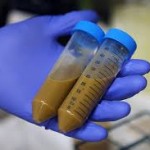Fecal Transplant For C. Difficile
Fecal microbiota (see here for some background on microbiota) transplantation (FMT) is defined by the Fecal Transplant Foundation (FTF) as ” a procedure in which fecal matter, or stool, is collected from a tested donor, mixed with a saline or other solution, strained, and placed in a patient, by colonoscopy, endoscopy, sigmoidoscopy, or enema.”
The FTF states that the “purpose of fecal transplant is to replace good bacteria that has been killed or suppressed, usually by the use of antibiotics, causing bad bacteria, specifically Clostridium difficile, or C. diff., to over-populate the colon. This infection causes a condition called C. diff. colitis, resulting in often debilitating, sometimes fatal diarrhea.”
Clostridium Difficile
C. diff. is a very serious infection, and the incidence is on the rise throughout the world. The FTF states that C. diff. “…currently causes about 250,000 hospitalizations and 14,000 deaths each year in the U.S. – have become highly resistant to treatment, leading to a 30 percent treatment failure rate in patients infected with those strains.”
The danger from C. diff. is so great that vaccines and other treatments to prevent and treat C. diff. infection are currently in development:
- Sanofi Pasteur is ahead with a vaccine candidate in phase III.
- Pfizer disclosed in November 2014 that it decided to halt further recruitment and vaccination for its ongoing Phase 2 study of PF-06425090, its candidate vaccine, and “is evaluating potential next steps for the C. difficile clinical development program.”
- Rebiotix has a microbiota suspension delivered by enema currently in a phase II study.
Fecal Transplant Not Approved by FDA
While medical journals continued to proclaim the success of FMT, in July 2013 the FDA produced a Guidance for Industry on FMT in which they stated that “…the efficacy and safety profiles of this intervention have not yet been fully evaluated in controlled clinical trials.” The FDA goes on to state that they ” …intend to exercise enforcement discretion regarding the investigational new drug (IND) requirements for the use of fecal microbiota for transplantation (FMT) to treat Clostridium difficile (C. difficile) infection not responding to standard therapies. FDA intends to exercise this discretion provided that the treating physician obtains adequate informed consent from the patient or his or her legally authorized representative for the use of FMT products. Informed consent should include, at a minimum, a statement that the use of FMT products to treat C. difficile is investigational and a discussion of its potential risks. FDA intends to exercise this discretion on an interim basis while the agency develops appropriate policies for the study and use of FMT products under IND.”
Delivering FMT
If traditional antibiotic therapy is not working for patients with C. diff. infections, FMT may be delivered via various methods.
The most traditional is a suspension that must be delivered via endoscopy or by colonoscopy, sigmoidoscopy, or enema. All of these methods are relatively expensive and have their own inherent risks and must be performed in a clinic or hospital setting.
To reduce cost, risk, and patient discomfort, oral preparations in the form of a capsule have been developed. One such approach was reported in JAMA :”Stool samples were gathered from healthy adult volunteers who had been comprehensively screened for infectious diseases and avoided eating common allergens for several days before donating. The samples were filtered, diluted, screened, placed into capsules and frozen for four weeks to enable retesting of donors for important viral infections. On two consecutive days each participant received 15 FMT capsules, which most of them ingested within a few minutes. ” They reported that the therapy provided “…an overall success rate of 90 percent for the study group.”
Summary
The vaccine in development from Sanofi should be able to prevent many C. diff infections when available providing those at risk are immunized. Should C. diff infection not respond to antibiotic therapy, the use of FMT seems appropriate given the generally positive success rate and few reports of adverse events.
Additional Reading
- “How does Fecal Microbiota Transplantation work?”, OpenBiome.com; available at: http://www.openbiome.org/about-fmt/
- “Guidance for Industry: Enforcement Policy Regarding Investigational New Drug Requirements for Use of Fecal Microbiota for Transplantation to Treat Clostridium difficile Infection Not Responsive to Standard Therapies”, July 2013; available at: here
- Centers for Disease Control and Prevention. Investigating Clostridium difficile Infections Across the U.S.; available at: http://www.cdc.gov/features/AntibioticResistanceThreats/index.html
- Youngster I, Russell GH, Pindar C, Ziv-Baran T, Sauk J, Hohmann EL. Oral, Capsulized, Frozen Fecal Microbiota Transplantation for Relapsing Clostridium difficile Infection. JAMA. 2014;312(17):1772-1778. doi:10.1001/jama.2014.13875.; abstract available at: http://jama.jamanetwork.com/article.aspx?articleid=1916296



Leave a Reply
You must be logged in to post a comment.